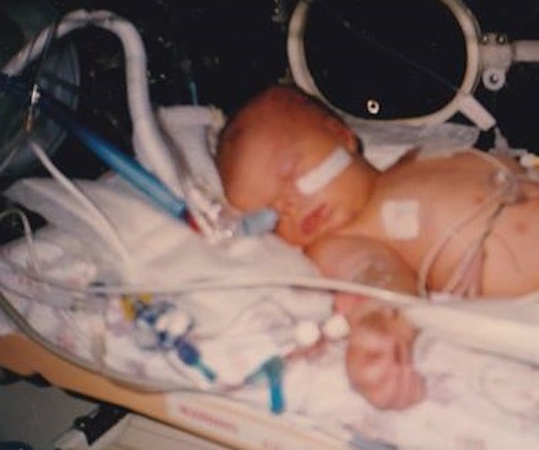This is a photo of me when I was in an incubator at 1 day old.

When I was born, I didn’t breathe. I was a stillborn, but I was resuscitated. As a result of me not breathing, and in that period when my brain didn’t get the oxygen I needed, brain damage occurred. I was on a ventilator for two days. The doctors turned my life support down so they could find out whether I would breathe on my own, and I did.
Some people say they feel sorry for me because I have my disability, cerebral palsy, but I don’t want any kind of pity. I wouldn’t say my disability is that severe. I can do a lot of things. Here’s one thing I can do: I can use my feet to operate my computer. I can do this quite easily. My type of cerebral palsy is quadriplegic (affects all four limbs) athetoid (uncontrollable movements) cerebral palsy, and it affects every muscle in my body, apart from my heart (luckily). I like to be as independent as possible, but there are some things I need help with.
People often say they “feel sorry” for me, and that makes me feel unhappy and awkward because I am who I am, and I can’t change that. I don’t want anyone to pity or feel sorry for me just because I have cerebral palsy. If I didn’t have cerebral palsy, I wouldn’t be the person I am today, and I wouldn’t have met some of the awesome people I know. So next time you think of feeling sorry for me, please don’t.
I feel that some people ignore me because they just walk past like I am not there, and sometimes they push past me. This makes me really angry because if I was up and walking around, I believe they would treat me like any other person. People stare at me, and I think this is because I am different, but there is no shame in being different.
A lot of people define other people as “normal,” but what is normal? Just because I use a wheelchair doesn’t mean I am any different to you. I still feel and think the same as you, so I am not very different to you after all.
I really hate it when people stare at me because it is rude, and I would rather you ask me what you are wondering. Some people do ask me questions, which I don’t mind, but then they don’t give me the chance to answer. This annoys me because if they can’t wait for me to answer their questions, what is the point in asking? Sometimes they do listen and do not understand what I have said but pretend they do and give a reply that is completely irrelevant. They even guess what I am saying by interrupting me, or they just dismiss what I say to them, which is really frustrating for me. I have to put a lot of effort into talking clearly so they can understand. Yes, my speech isn’t that great, but if you take the time to listen to me, in the end you can understand me most of the time.
Some people think I can’t speak, but I can! When I am talking to someone, sometimes my arms move around more than usual, especially when I get anxious about my speech getting worse. I am not always keen on talking to someone I don’t talk to very often because I worry about whether they can understand me or not. If I do speak to you, please let me take my time, and please listen to me properly.
I wish people would see me rather than my wheelchair; the person inside it is much more interesting! Some people think I am completely dependent, but I try to do as much as I can without help.
So what I’m trying to say is, you shouldn’t judge a book by its cover. It’s much better to get to know the person before you jump ahead and assume things. If one person changes the way they look at disabilities, that person may very well change other people’s views, too. So why not see beyond the disability?
The Mighty is asking the following: What’s one thing people might not know about your experience with disability, disease or mental illness, and what would you say to teach them? If you’d like to participate, please send a blog post to community@themighty.com. Please include a photo for the piece, a photo of yourself and 1-2 sentence bio. Check out our Submit a Story page for more about our submission guidelines.
